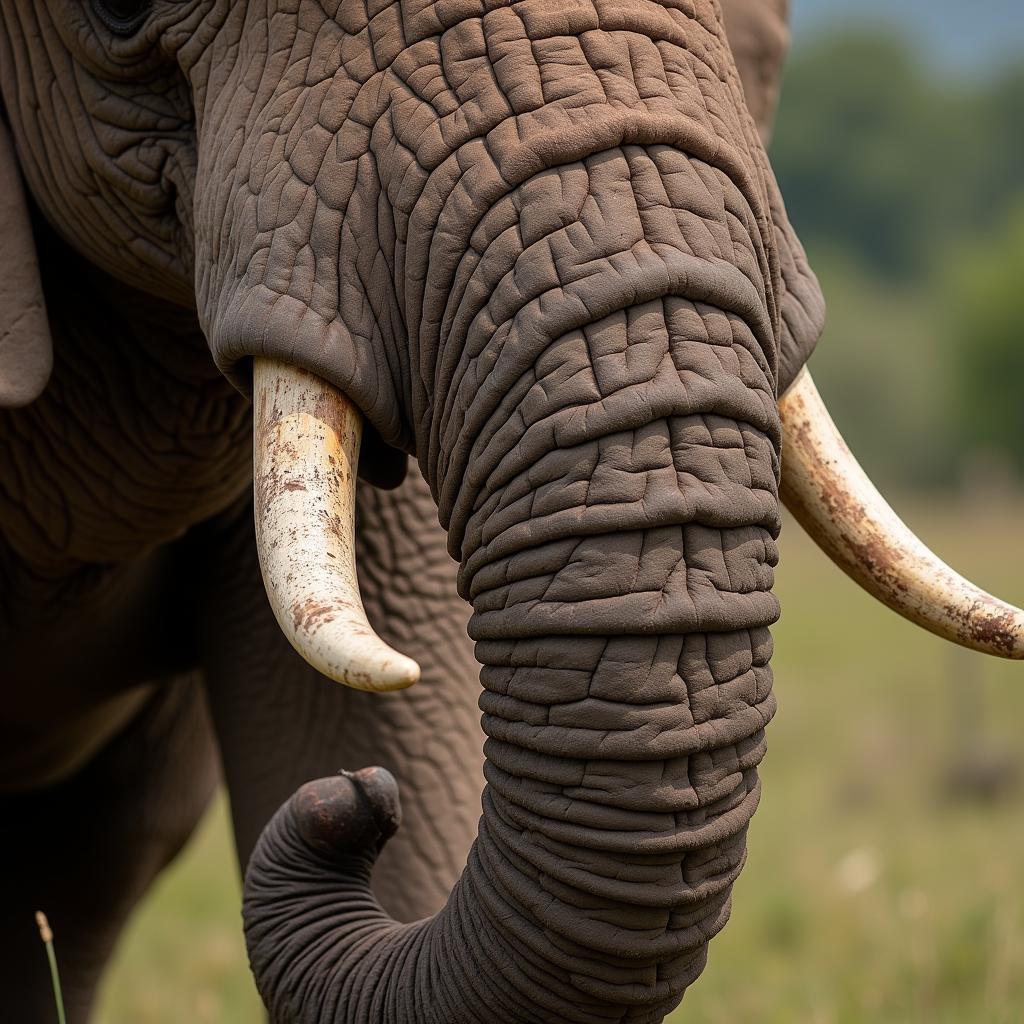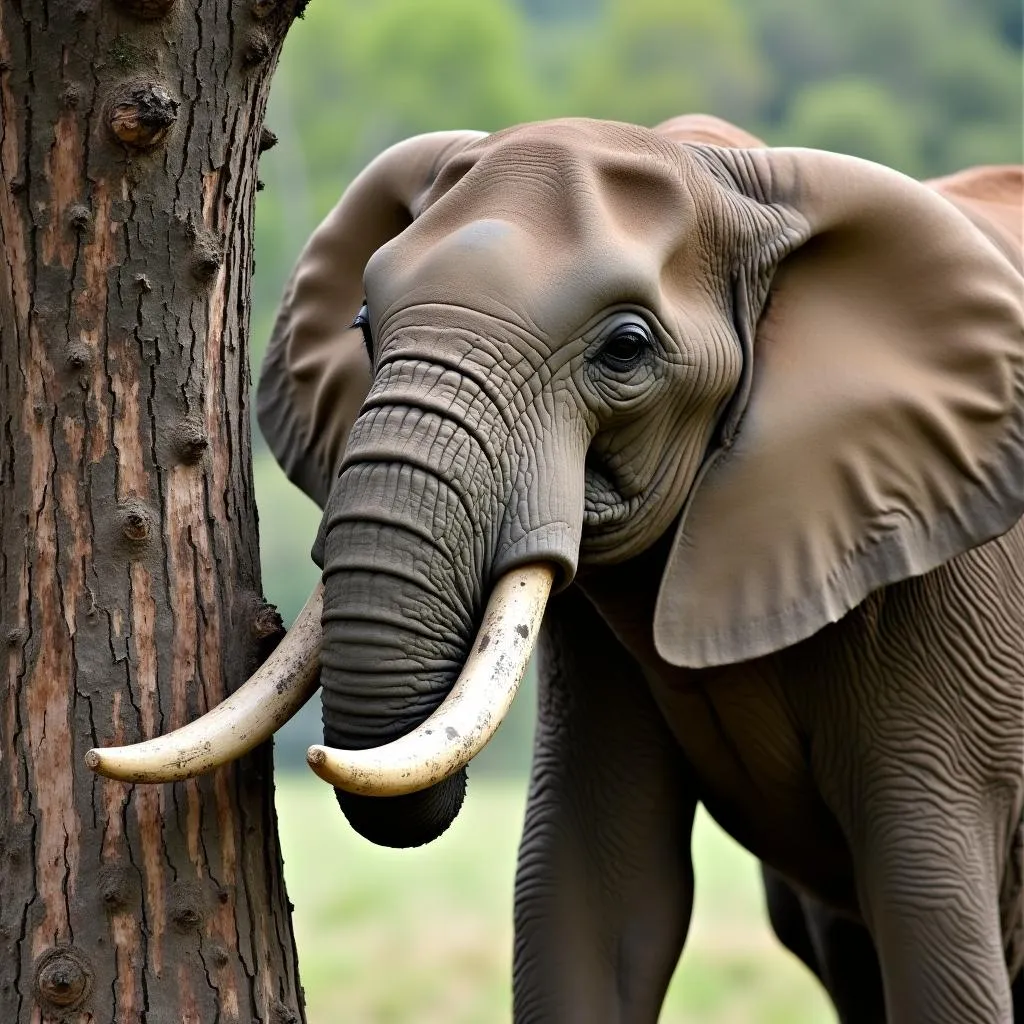African Elephant Endangered Species Facts: A Stark Reality
The African elephant, an iconic symbol of the African continent, faces a perilous future as an endangered species. Human activities, including habitat loss and poaching, have pushed these majestic creatures to the brink. This article delves into the facts surrounding the African elephant’s endangered status, highlighting the urgent need for conservation efforts to ensure their survival.
 African Elephant Family in Savanna
African Elephant Family in Savanna
The Plight of Giants: Understanding the Decline
African elephants, comprising two species – the African bush elephant and the smaller African forest elephant – play a crucial role in their ecosystem. As herbivores, they shape the landscape, creating clearings that benefit other animals and promoting plant diversity. However, their populations have plummeted in recent decades.
Poaching: The Ivory Trade’s Devastating Impact
The illegal ivory trade stands as the most significant threat to African elephants. Driven by high demand for ivory, particularly in Asian markets, poachers target elephants for their tusks, decimating populations and leaving countless orphans in their wake. Despite international efforts to combat poaching, it remains a persistent problem, fueled by organized crime and corruption.
 African Elephant Tusks Close-up
African Elephant Tusks Close-up
Habitat Loss: A Shrinking World for Elephants
As human populations expand, so too does the demand for land. This expansion leads to habitat loss and fragmentation, forcing elephants into smaller and more isolated areas. This confinement results in increased competition for resources and human-wildlife conflict, further jeopardizing their survival.
Conservation Efforts: A Glimmer of Hope
The crisis facing African elephants has sparked global concern, leading to various conservation initiatives aimed at protecting these magnificent creatures.
Anti-Poaching Measures: Protecting Elephants on the Ground
Anti-poaching patrols, often involving rangers equipped with advanced technology, work tirelessly to deter and apprehend poachers. Community-based conservation programs, which engage local communities in conservation efforts and provide alternative livelihoods, are also crucial in combating poaching.
 African Elephant Orphanage Care
African Elephant Orphanage Care
Habitat Protection and Restoration: Securing Space for Elephants
Establishing protected areas, such as national parks and wildlife reserves, is vital to safeguard elephant habitats. Reforestation efforts and wildlife corridors, which connect fragmented habitats, aim to restore and expand the elephants’ range.
The Future of African Elephants: A Collective Responsibility
The fate of African elephants rests in our hands. By supporting conservation organizations, advocating for stricter anti-poaching measures, and making informed consumer choices, we can all contribute to ensuring these magnificent creatures continue to roam the African landscape for generations to come.
FAQs about African Elephant Endangered Species Facts
1. How many African elephants are left in the wild?
While exact numbers are difficult to determine, it’s estimated that around 415,000 African elephants remain.
2. Why are African elephants important to the ecosystem?
As ecosystem engineers, their browsing and digging habits create habitats for other species and influence vegetation structure.
3. What can I do to help protect African elephants?
You can support reputable conservation organizations, educate yourself and others about the ivory trade, and avoid purchasing ivory products.
4. Is it true that both African elephant species are endangered?
Yes, both the African bush elephant and the African forest elephant are listed as endangered.
5. Are there any successful elephant conservation stories?
Yes, some areas have seen elephant population increases due to dedicated conservation efforts, offering hope for the future.
For more information on African elephants and other fascinating aspects of African wildlife, explore these articles:
Need help with your African safari or have questions about African wildlife conservation? Don’t hesitate to contact us:
Phone: +255768904061
Email: kaka.mag@gmail.com
Address: Mbarali DC Mawindi, Kangaga, Tanzania.
We have a dedicated customer support team available 24/7 to assist you!


